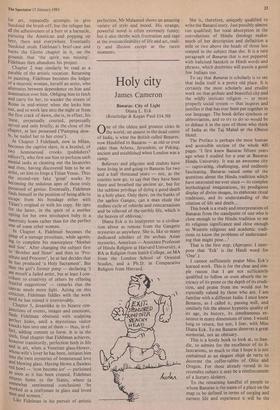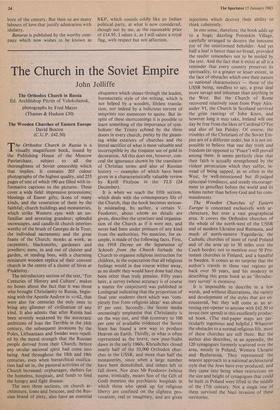Holy city
James Cameron
Banaras: City of Light Diana L. Eck (Routledge & Kegan Paul £14.50) rIne of the oldest and greatest cities in V the world, set almost in the dead centre of India, is what the British called Benares, now Hindified to Banaras — as old or even older than Athens, Jerusalem, or Peking, ancient and established when London was a camp.
Believers and pilgrims and zealots have been living in and going to Banaras for two and a half thousand years — not, as the tourists now go, to say that they have been there and breathed the ancient air, but for the sublime privilege of dying a good death in a holy place. Only there, on the banks of the ageless Ganges, can a man elude the endless cycle of rebirths and reincarnations and be relieved of the earthly life, which is the heaven of oblivion.
Diana Eck is its interpreter to a civilisa- tion about as remote from the Gangetic mysteries as anywhere. She is, like so many dedicated scholars of the archaic Asian mysteries, American — Associate Professor of Hindu Religion at Harvard University, a BA in Religion from Smith College, an MA from the London School of Oriental Studies, and a Ph.D. in Comparative Religion from Harvard.
She is, therefore, uniquely qualified to write the Banarsi story. Just possibly almost too qualified; her total absorption in the convolutions of Hindu theology makes much of her description and definition a mile or two above the heads of those less steeped in the subject than she. It is a rare paragraph of Banaras that is not peppered with italicised Sanskrit or Hindi words and phrases, which doubtless will puzzle a good few Indians too.
To say that Banaras is scholarly is to say that India itself is a pretty old place. It is certainly the most scholarly and erudite work on that archaic and beautiful city and the wildly intricate religion — or more properly social system — that inspires and justifies it that has ever been put together in our language. The book defies synthesis or abbreviaticin, and to try to do so would be to debase it in the eyes of those who think of India as the Taj Mahal or the Oberoi Hotel.
The Preface is perhaps the most human and accessible section of the whole 400 pages: 'I first knew Banaras fifteen years ago when I studied for a year at Banaras Hindu University. It was an awesome city — captivating, challenging, and endlessly fascinating. Banaras raised some of the questions about the Hindu tradition which have interested me ever since — its complex mythological imaginations, its prodigious display of divine images, its elaborate ritual traditions, and its understanding of the relation of life and death...
This book is a study and interpretation of Banaras from the standpoint of one who is close enough to the Hindu tradition to see its religious significance and close enough to Western religious and academic tradi- tions to know the problems of understand- ing that might pose...'
That is the first step. (Apropos: 1 inter- pose that 'Eck' is the Hindi word for 'One'.)
I cannot sufficiently praise Miss Eck's learned work. This is for the clear and sim- ple reason that I am not sufficiently qualified to follow or even absorb the in- tricacy of its prose or the depth of its erudi- tion, and praise from me would not be especially valued by those who are. I am familiar with a different India. I once knew Benares, as I called it, passing well, and similarly felt the almost hypnotic quality of its age, its history, its simultaneous ex- istence in many dimensions of time. I would long to return, but not, I fear, with Miss Diana Eck. To me Banaras deserves a great memorial, not an obituary.
This is a lovely book to look at, to han- dle, to admire for the excellence of its il- lustrations, so much so that I hope it is not embalmed as an elegant objet de vertu to decorate the coffee-tables of Ohio and Oregon. For those already versed in its recondite subject it may be a reinforcement of a literary idolatry.
To the remaining handful of people to whom Banaras is the name of a place on the map to be defined in terms of surging and earnest life and experience it will be the bore of the century. But then so are many labours of love that justify admiration with idolatry.
Banaras is published by the worthy com- pany which now wishes to be known as
RKP, which sounds oddly like an Indian political party, at what is now considered, though not by me, as the reasonable price of £14.95. I salute it, as 1 will salute a royal flag, with respect but not affection.







































 Previous page
Previous page